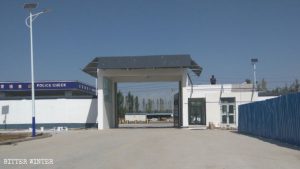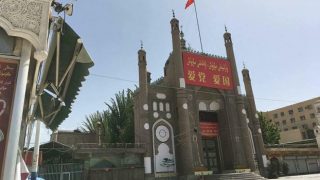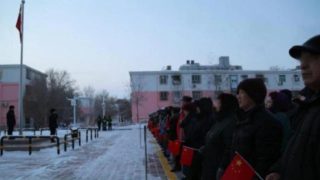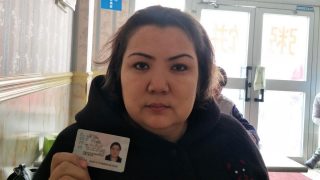
Despite officially ending “re-education through labor” five years ago, Xinjiang is bringing back labor camps. And the Party is reaping the profits.
There is growing evidence that Muslim detainees in transformation through education camps are being forced to perform manual labor. The laojiao or “re-education through labor” system, which was abolished by the Chinese Communist Party (CCP) in 2013, is making a comeback: in fact, if not in name. The name “transformation through education camps” has replaced “re-education through labor camps,” but this does not mean that inmates are no longer required to work.
Recently, the forced labor to which Muslim detainees in the Xinjiang Uyghur Autonomous Region are being subjected has once again aroused attention from the international community.
New York Times reported in December 2018, “The evolution of the Xinjiang camps echoes China’s ‘re-education through labor’ system, where citizens once were sent without trial to toil for years. China abolished “re-education through labor” five years ago, but Xinjiang appears to be creating a new version.”
Bitter Winter has received reports detailing the forced labor and the conditions detainees are enduring.
An Uyghur woman speaking under the pseudonym of Melike, from Tacheng prefecture in Xinjiang, told Bitter Winer that her husband was sent to a camp for six months for reading scripture. After six months, he was sentenced to a further five years of imprisonment including forced labor.
Melike reports, “Living conditions at the camp are poor. Seventeen or 18 people live in a room measuring about 500 square feet, including the washroom. The room is smelly and dirty. They don’t eat well or sleep well. During the daytime, my husband is required to study and recite policies and regulations, and he is also required to perform unpaid labor. He has been assigned to make naan bread. Some other Muslims have been sent to work at a socks factory.”
In October 2018, Melike and other relatives of detainees received a warning from government officials who said that if their family members at the camp complied with the government’s policies, and the government says they had been adequately ‘transformed,’ then they could go home after their sentence is completed. “You need to support the government’s work,” the officials said. “If you disagree with the government’s decision and make statements unfavorable to the government, then your family members’ ‘study’ time will be extended.”
Melike said in despair, “It is still uncertain whether my husband will be released in five years. He will have to undergo ‘reform through labor’ for five years or even longer.”
Melike’s concerns are not unfounded. The “reform through labor” or laogai camps are part of the Chinese jail system where the courts of law send those found guilty of various crimes. The growing evidence from Xinjiang suggests that transformation through education camps are now encompassing the features of laogai camps, except that not only those guilty of criminal activities are sentenced to forced labor: belonging to an ethnic group or having a religion is crime enough to be “transformed” through labor.
Bitter Winter received confirmation about this tendency from a prison guard who supervises Muslim detainees in southern Xinjiang. The guard reports, “The Muslims who are being held in prisons now won’t be released even after their sentences have been completed. Instead, they will be transferred to a transformation through education camp to continue undergoing ‘reform through labor’ for at least five years. Inside the camps, there are factories where Muslims are forced to perform manual labor. After toiling for five years, they can only be released if the government says they have been properly ‘reformed.’ Otherwise, they will be detained indefinitely.”
The prison guard continued bluntly, “Actually, the government uses this approach to reduce Muslims in Xinjiang into free money-making tools, to generate high profits for the CCP. No matter how hard these Muslims work, they will not receive any opportunity for commutation. Many of them are likely to be imprisoned for life.”
It appears that the system of forcing detainees to engage in long-term unpaid labor will be extended throughout Xinjiang. Not long ago, Bitter Winter exposed a huge transformation through education camp in the Huocheng county under the administration of Ili Kazakh Autonomous Prefecture, Xinjiang. Adjacent to the camp is a large-scale production base that contains nine factory buildings, including a clothing factory, electronics factory, and food processing factory. According to one manufacturer in the production facility, “students” detained at the camps will be sent to the factories to work.
Aside from building large production facilities near camps, the authorities have also introduced some private enterprises into the system of transformation through education camps to provide Uyghur detainees with production technology training.
Mr. Shen (a pseudonym) has operated a clothing factory in Xinjiang for several years. To ensure that his factory continues operation, he has decided to work closely with the government. He moved his production workshop into the basement of a small-scale secret transformation through education camp, where the local government has sent some detained Uyghur women. The youngest among them is only 17 years old. Mr. Shen’s employees at the clothing factory are responsible for providing prisoners with technical training.
Mr. Shen complained, “For the first three months, they [the prisoners] couldn’t do any productive work. In the following three months, they could do just a little work. The money earned from their labor isn’t enough to pay the wages for my workers to train them. After the six-month training period is over, these Uyghur women will be transferred to a transformation through education camp in another region, turning them into machines that work for the government for free.” Mr. Shen said that the authorities are promoting this business model in other places as well.
Ilshat Hassan, president of the U.S.-based Uyghur American Association (UAA), previously called attention to the return of forced labor in China. “This kind of system [forced labor] has never disappeared,” he said. “It is just being extended to a large scale now. Everyone thinks that it is making a comeback.”
Source:Bitter Winter / Li Zaili



